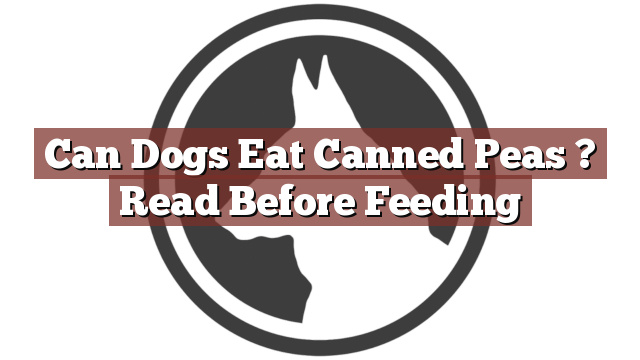Understanding Your Dog’s Dietary Needs
As a responsible pet owner, it is essential to understand your dog’s dietary needs to ensure their health and well-being. Dogs require a balanced diet that includes proteins, carbohydrates, fats, vitamins, and minerals. While commercial dog food provides a complete and balanced diet, many pet owners also like to supplement their dog’s meals with certain human foods. However, it is crucial to know which foods are safe and beneficial for dogs and which ones can be harmful to their health.
Can Dogs Eat Canned Peas? Read Before Feeding
Can dogs eat canned peas? This is a common question among dog owners who want to give their furry friends a variety in their diet. The answer is yes, dogs can eat canned peas, but there are a few things to consider before feeding them to your canine companion.
Canned peas are a convenient way to provide your dog with some added nutrients and fiber. Peas are a good source of vitamins A, B, and K, as well as minerals like potassium and iron. Plus, they are low in fat and calories, which makes them a healthy addition to your dog’s diet. However, it is important to remember that peas should only be given as an occasional treat and not as a substitute for a complete and balanced dog food.
Pros and Cons of Feeding Canned Peas to Dogs
Feeding canned peas to dogs has its pros and cons. Let’s take a look at both sides:
Pros:
-
Nutritional benefits: Canned peas provide essential vitamins and minerals that can contribute to your dog’s overall health.
-
High in fiber: Peas are rich in dietary fiber, which can help regulate your dog’s digestion and promote a healthy gut.
-
Low in fat and calories: If your dog needs to shed a few pounds or has a tendency to gain weight, canned peas can be a healthy alternative to high-calorie treats.
Cons:
-
Sodium content: Many canned vegetables, including peas, are high in sodium. Excessive sodium intake can lead to health issues such as increased blood pressure and kidney problems in dogs. Therefore, it is important to choose low-sodium or no-salt-added canned peas if you decide to feed them to your dog.
-
Digestive issues: Some dogs may have a hard time digesting peas, especially if they are not used to eating them. It is recommended to introduce canned peas gradually into your dog’s diet and monitor their digestive response.
-
Allergies: Like any food, dogs can develop allergies or sensitivities to peas. If you notice any signs of an allergic reaction, such as itching, vomiting, or diarrhea, discontinue feeding canned peas and consult your veterinarian.
Conclusion: Consideration and Moderation are Key
In conclusion, feeding your dog canned peas can be a safe and nutritious addition to their diet if done in moderation. Remember to choose low-sodium options and introduce them gradually. Always observe your dog’s response and consult your veterinarian if you have any concerns. While canned peas can offer health benefits, they should not replace a balanced dog food diet. As a responsible pet owner, it is crucial to prioritize your dog’s overall health and well-being by providing them with a well-rounded and appropriate diet.
Thank you for taking the time to read through our exploration of [page_title]. As every dog lover knows, our furry friends have unique dietary needs and responses, often varying from one canine to another. This is why it's paramount to approach any changes in their diet with caution and knowledge.
Before introducing any new treats or making alterations to your dog's diet based on our insights, it's crucial to consult with a veterinarian about [page_title]. Their expertise ensures that the choices you make are well-suited to your particular pet's health and well-being.
Even seemingly harmless foods can sometimes lead to allergic reactions or digestive issues, which is why monitoring your dog after introducing any new food item is essential.
The content provided here on [page_title] is crafted with care, thorough research, and a genuine love for dogs. Nevertheless, it serves as a general guideline and should not be considered a substitute for professional veterinary advice.
Always prioritize the expert insights of your veterinarian, and remember that the health and happiness of your furry companion come first.
May your journey with your pet continue to be filled with joy, love, and safe culinary adventures. Happy reading, and even happier snacking for your canine friend!

